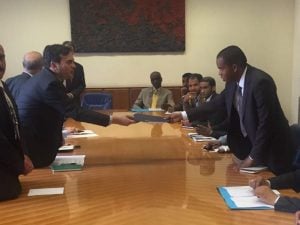By Moutaz Mathi.

Tripoli, 19 June 2016:
Backed by the Italian government, the Rome-based Sant’Egidio community is to send urgent medical and humanitarian aids to a number of towns in southern Libya. This was agreed at a meeting yesterday in Rome that included a number of politicians, tribal elders and social activists from Fezzan.
“The aid will be provided with the cooperation and supervision of the Presidency Council,” Hussein Al-Ansari, former member of General National Congress for Obari, told the Libya Herald. “Today’s meeting and agreement is an outcome of several previous meetings held with some Presidency Council members and the community,” he added.
He was referring to the community’s mediation in talks late last year between the Tebu and Tuareg communities which finally brought about a degree of peace between the two.
Sebha and neighbouring towns were in dire need of medicines, Ansari said, and it has been agreed to provide safe passage for them. The initial focus, he added, would be on areas most in need of aid.
As elsewhere in Libya, the south has suffered from shortages in all fields including long electricity cuts. The past three days have seen almost continuous blackouts in the south, in part resulting from transmission lines in the Brak Al-Shatti area being brought down.
The difference, however, is that the region’s problems have not made headlines. International attention has been focussed almost entirely on the privations in Tripoli and Benghazi.
As a result several activists have called for main city in Fezzan, Sebha, to be designated as a disaster area.
“The city suffers from long power cuts which sometimes lasting 48 hours, plus shortages of drinking water,” Mohamed Abdul Motaleb, from Sebha Central Hospital, told this paper. “The hospital, along with patients and equipment, cannot bear such a situation and we’re afraid that there will be a humanitarian disaster as a result,” he said.
“The agreement signed in Rome is yet another step towards the stabilisation of Libya,” said Italian Undersecretary of Foreign Affairs, Vincenzo Amendola, who met the Fezzan delegation along with representatives of the Sant’Egidio community at the foreign ministry.
The agreement, facilitated by the community, was another sign of Italy’s commitment to peace in Libya and to the Government of National Accord led by Faiez Serraj, he stressed.
As a result, emergency aid as well as children’s vaccination kits would be sent to hospitals in all Fezzan districts. He added that as part of the agreement, representatives of the ICRC, the Italian foreign ministry’s international cooperation office and various NGOs would be present in Fezzan to verify distribution.
The Italian government would continue to monitor the situation he stated, pointing out that Italy was already sending food aid and emergency medical supplies to Tripoli, Benghazi and Obari, Amendola said. “The unanimously-signed document leaves us hope that the road taken for the future of Libya is the right one.”








